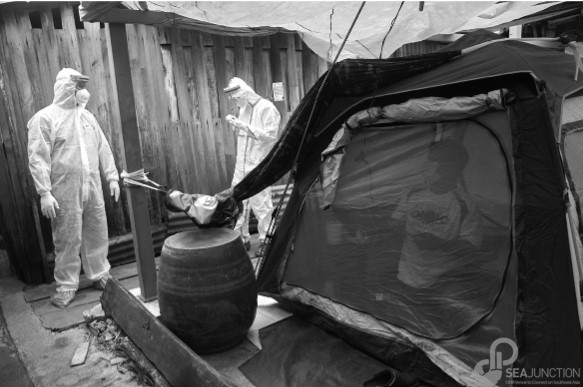
Uninfected Family Members Stay in a Tent while Those Infected Self-Isolate
at Home in an Impoverished Urban Area in Bangkok (July 26, 2021)
The impacts of the COVID-19 pandemic in Thailand, like in the rest of the world, have transcended public health. The country’s containment measures and strict border control in 2020 limited the toll on human life, but its economy was among the worst affected in Southeast Asia, contracting 6.1 percent for the year after growing 2.4 percent in 2019 (ADB 2022). In this chapter, Teeranong Sakulsri, Rapeepun Jommaroeng, and Rosalia Sciortino will explore the key findings from the impact of the pandemic in Thailand, with the main emphasis on those “Left Behind” in the informal sector, including sex workers, migrant workers, and other marginalized citizens in the society.
Rapeepun Jommaroeng is a lecturer at the Department of Community Health, Faculty of Public Health, Mahidol University, teaching health economics, research methodology, global health, sexual orientation, and gender identity. He is also an LGBTIQ+ activist with Rainbow Sky Association of Thailand since 2002 and a board member of the Thai National AIDS Foundation, advocating for effective domestic HIV financing. He has a PhD in demography with a visiting research fellowship at the Johns Hopkins Bloomberg School of Public Health in Baltimore, USA. He has five master’s degrees in population and reproductive health research, mass communications, public health, public administration, and business administration. His published works include HIV-associated risk behaviors, universal health coverage in Thailand, targeted healthcare system development, and program evaluation among vulnerable populations. He has received funding from the British Embassy, Bangkok, and the Thai Health Fund to study social determinants of health and to pilot the first targeted health services on non-communicable diseases for lesbian, gay men, and transgender people in Thailand.
Rosalia Sciortino holds professorships in social sciences and international development at Mahidol and Chulalongkorn Universities, she is the Founder and Executive Director of SEA Junction, a Southeast Asia-Focused foundation. Previously, she served as regional director for Southeast Asia at the International Development Research Centre and the Rockefeller Foundation and officer for the Ford Foundation in Indonesia and the Philippines.
Teeranong Sakulsri received her doctoral degree in Population Study from Mahidol University in 2015 and is an Associate Professor at the Institute for Population and Social Research (IPSR), Mahidol University. In 2019, she was Visiting Research Fellow at the University of Sussex with the Migrating Out of Poverty Research Programme Consortium and in 2018, she was funded by the Mekong-ROK Cooperation Fund, Republic of Korea to conduct policy research on safe migration for migrants from the Mekong countries to Thailand. Her current projects focus on migrant workers’ rights in Thailand, especially in agriculture and elderly care.
Who-Cares-Covid-19-Chapter4-SEAJunction

